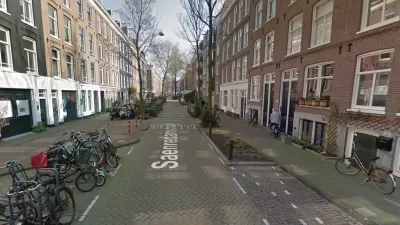Ruben Anderson suggests that if automobile parking could be kept to properties, that could free up the former on-street parking to become Garden Streets, so that cities could grow much more of their own produce.
"Cleveland, Ohio is a hub of Asphalt Gardening, where planter boxes are put right on top of parking lots, separated from the polluted soil and oily road by a layer of wood chips. This would be a great way to try Garden Streets -- do a block or two, then a couple of years later rip up the asphalt and put roots down.
I happen to live in Vancouver, where the city council passed a motion to have 2010 new garden plots by 2010. A handy graph on the linked page shows there is not even a dream of actually achieving it, even though it is a pittance by some standards. (The city-state of Singapore, for example, produces 25 per cent of its own vegetables.)
So call me the answer to Vancouver City Hall's prayers because 2010 new garden plots is only 14 blocks of Garden Streets.
Could we start street gardening without a controversial bylaw to eliminate street parking? Sure. The city could run a newspaper ad explaining the idea and asking blocks to volunteer. Let the citizens do all the legwork of convincing their neighbors. Using bio-intensive gardening methods, my block could provide all the vegetables needed for 22 people, plus all the plant material needed to keep the soil productive -- no need for chemical fertilizers here.
'Arable Acres' found that Vancouver could grow all its own produce by farming the existing front and back yards. Times have changed since the study was done in 1980 -- there are more people living in the city, and development has eaten up space. But other things have changed too. That study suggested those gardens could produce $100 million worth of produce. That is $265,000,000 in today's dollars.
The possibilities make your head spin -- 70 hectares of farm in Burnaby produce 10 per cent of the vegetables grown in the Fraser Valley. Arable Acres estimates Vancouver has about 3,000 hectares in streets and another 3,000 hectares in yards. Putting this into practice, the Edible Estates project is farming front yards in six cities across the United States, from Lakewood, California to Maplewood, New Jersey.
All of these delicious statistics beg the question whether the current trend in zoning experiments -- reduced on-site parking so drivers have to fight for spots on the street -- is entirely a good idea."
FULL STORY: Your Asphalt Parking Spot Can Become a Blooming Garden Plot

Alabama: Trump Terminates Settlements for Black Communities Harmed By Raw Sewage
Trump deemed the landmark civil rights agreement “illegal DEI and environmental justice policy.”

Study: Maui’s Plan to Convert Vacation Rentals to Long-Term Housing Could Cause Nearly $1 Billion Economic Loss
The plan would reduce visitor accommodation by 25% resulting in 1,900 jobs lost.

Planetizen Federal Action Tracker
A weekly monitor of how Trump’s orders and actions are impacting planners and planning in America.

Wind Energy on the Rise Despite Federal Policy Reversal
The Trump administration is revoking federal support for renewable energy, but demand for new projects continues unabated.

Passengers Flock to Caltrain After Electrification
The new electric trains are running faster and more reliably, leading to strong ridership growth on the Bay Area rail system.

Texas Churches Rally Behind ‘Yes in God’s Back Yard’ Legislation
Religious leaders want the state to reduce zoning regulations to streamline leasing church-owned land to housing developers.
Urban Design for Planners 1: Software Tools
This six-course series explores essential urban design concepts using open source software and equips planners with the tools they need to participate fully in the urban design process.
Planning for Universal Design
Learn the tools for implementing Universal Design in planning regulations.
Caltrans
Smith Gee Studio
Institute for Housing and Urban Development Studies (IHS)
City of Grandview
Harvard GSD Executive Education
Toledo-Lucas County Plan Commissions
Salt Lake City
NYU Wagner Graduate School of Public Service




























